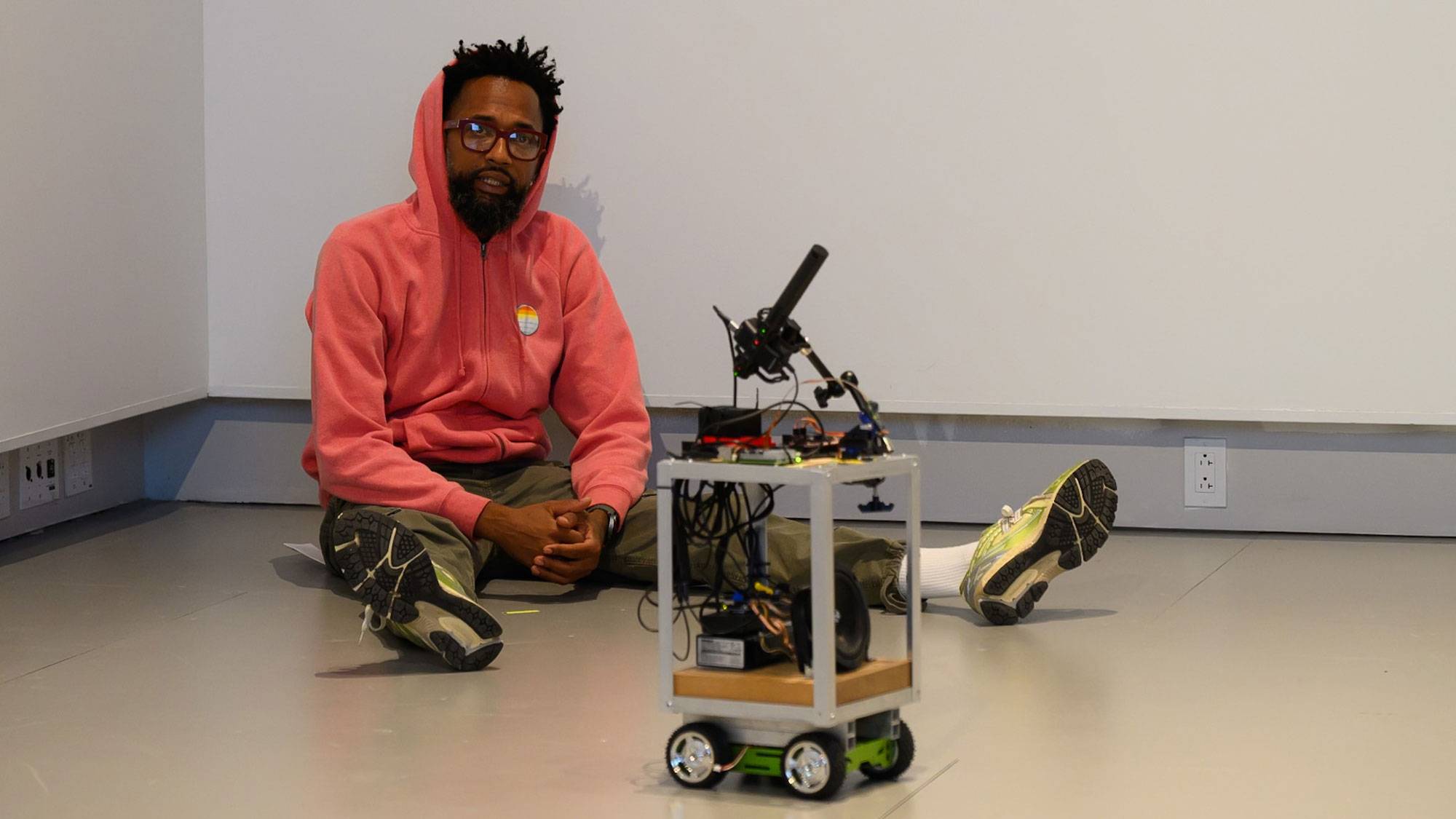Richard Maxwell, playwright and artistic director of the New York City Players, was invited to Colgate University as the most recent Christian A. Johnson Foundation Artist-in-Residence from Sept. 29 to Oct. 9. While at Colgate, Maxwell met with classes, gave a lecture, and shared his work in progress with an open studio in Bernstein Hall.
Since the early 1990s, Maxwell has made a name for himself in theater circles by “eschewing the tropes of acting, in particular Method acting, while adhering to the fundamentals of straight-ahead, written storytelling, in an era of nonlinear, abstract performance work,” Maxwell said.
In 1998, Maxwell used a commissioned robot in his theater work for the first time. He described his Colgate residency as a small part of an ongoing experiment with robots, empathy, and AI.
The Christian A. Johnson artist-in-residence program gave Maxwell time to conduct his experiment with the help of Colgate students and faculty, and it brought new artistic ideas to campus. He and other members of the New York City Players spent time with classes in theater, art, and computer science.
NYC Players technology designer Andrew Parrish worked with computer science students to develop a robot that used AI. Craig Arquiett ’27 had the opportunity to work with Maxwell and Parrish.
“I learned a lot working with Richard and Andrew,” Arquiett explained. “AI was involved in a few different ways, including the robot’s listening and speech capabilities. I interacted with AI while programming the robot’s eye, which used AI software to determine what it was looking at. The robot could identify whether it was looking at a dog or a person and where that entity stood. Based on this information, the robot decided how to move around.”
With his interest in the untrained actor, Maxwell also had students like Arquiett make brief cameos in the open studio performance. Maxwell was not looking to put on a polished performance, evidenced by actors reading from scripts projected on a wall behind the audience.
More theater-oriented students also had the opportunity to work with Maxwell. Theater major Tanner Harmon ’26 was the assistant stage manager and had a cameo in the open studio performance. Initially, Harmon was skeptical about the use of AI in theater.
“I am a firm believer that the unmediated relationship of live performance is what makes what we do magical,” Harmon said. “For me, the idea that a computer program could be substituted for a human relationship is theatrical blasphemy. I think the robot ended up being surprising and funny and strikingly in tune with the scene more often than I would expect. I still believe that theater happens between humans, but maybe robots can have a role.”
Maxwell has won many awards for his work, including a Guggenheim Fellowship, a Doris Duke Award, and a grant from the Foundation for Contemporary Arts. His philosophy is the foundation of his eventual success: “The less interpreting done by the artist, the more interpreting done by the viewer,” Maxwell said. “This information came to me early on in the midst of my own failure as a director and a writer.”
In trying to get out of the way of his stories, Maxwell practiced minimalism in acting and staging. From this, the press interpreted his works as robotic. Instead of being insulted and changing or defending his creative style, Maxwell was intrigued. He began to wonder where the line was drawn between robotic and robot; he asked a peer to create a robot for him. In the late 1990s and early 2000s, Maxwell became interested in evoking audience empathy using robots.
“One thing I’ve noticed about robots is that they make a splash when they do something new and spectacular, but I became interested in what the robot cannot do, its limits, because this is where I feel empathy, on the part of the viewer, is enlisted,” Maxwell explained. “It’s the same reason that I'm drawn to the actor without training. I’ve often worked with trained actors, but I remain interested in what is amateur in all of us.”
Empathy for robots has only become more complicated since Maxwell began experimenting with them in his plays. Now, with artificial intelligence, robots are seen as threats to jobs, communities, and civility. Can robots still evoke empathy in the same way within these new contexts? It is that very question that Maxwell explored throughout his residency.
“It’s through this initiative that we are having these lively conversations across the different departments,” Maxwell said. “I think we all benefit by getting out of certain patterns of thinking, and it’s just great to be here.”
The Christian A. Johnson Endeavor Foundation Artist in Residence was sponsored by the Department of Theater and co-sponsored by the Department of Computer Science, Film and Media Studies Program, Department of Art, Colgate Arts Council, and the Office of Entrepreneurship and Innovation.
